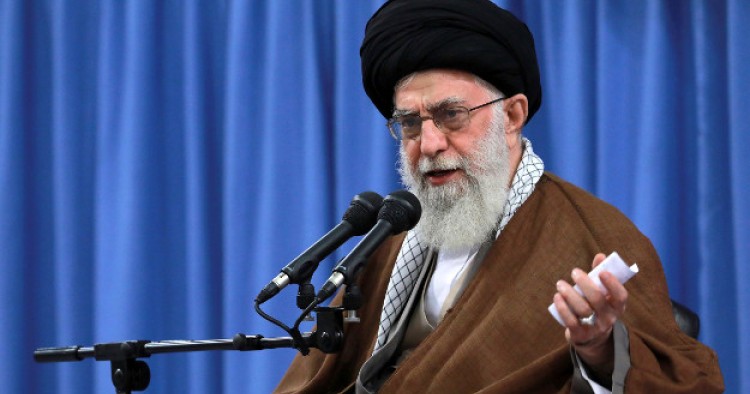Iran’s Supreme Leader Ali Khamenei has said that the United States committed a “strategic mistake” by attacking Syria, the Iranian media reported. Speaking to a gathering of senior Iranian military officials on Sunday, Khamenei claimed the attack "strengthened terrorists" in the region and emphasized that the Islamic Republic would not “retreat from the field” in the face of U.S. threats. He further warned that the Trump administration – like its predecessors – would regret any military intervention in the Middle East. “Today, Europe has gotten into difficulty because of [its] mistake of empowering Takfiris [a term Iranian leaders use for Sunni militant groups], and people are not safe in their homes or on the streets. And America is also repeating the same mistake.” He called on the Iranian military leaders to disregard financial constraints and upgrade the country’s military and defense capabilities. And on Monday, Khamenei hailed Iranians and Iran-backed Shiite militiamen fighting in Syria and Iraq and warned that Iran’s “enemies” are seeking to weaken the Islamic Republic and destroy the “Islamic establishment.”
Comment: While Khamenei and other senior Iranian leaders stress that the Islamic Republic is undeterred by the U.S. strikes in Syria and will not alter its policies and actions in Syria or elsewhere, the Trump administration’s first attack against the Bashar al-Assad regime has created a lot of concern and questions in Tehran. The most important question for Iranian leaders appears to be whether the missile strikes was a one-time attack or the beginning of a deeper U.S. military involvement in Syria and the broader region.
It can also be inferred from Khamenei’s remarks that the Iranian regime is worried that the Trump administration may be willing to use force against Iran if tension between the two countries escalates further in the future. “America can certainly commit acts of crime, aggression and violation [of international law]. They have carried out these actions in other parts of the world. But the question is: Where will they dare to carry out such actions?” Khamenei said during his Sunday speech to Iranian military leaders.
During the U.S. presidential campaign, Iranian leaders – including Khamenei – uncharacteristically made complimentary remarks about then-candidate Donald Trump. Iranian military leaders, in particular, hoped that Trump’s positive view of Russian President Vladimir Putin and opposition to military intervention abroad would benefit Iran’s agenda in Syria and the broader Middle East. But that cautious optimism has changed into growing concern in Tehran since Trump took office in January and adopted an aggressive policy toward Iran, by imposing new sanctions against Iran’s ballistic missile program, reestablishing close ties with Washington’s traditional Sunni allies in the Middle East, and broadening the scope of U.S. military engagement in Syria and Iraq.
The Middle East Institute (MEI) is an independent, non-partisan, non-for-profit, educational organization. It does not engage in advocacy and its scholars’ opinions are their own. MEI welcomes financial donations, but retains sole editorial control over its work and its publications reflect only the authors’ views. For a listing of MEI donors, please click here.













